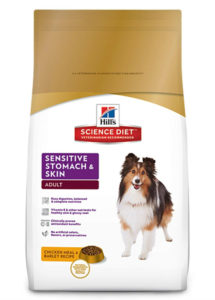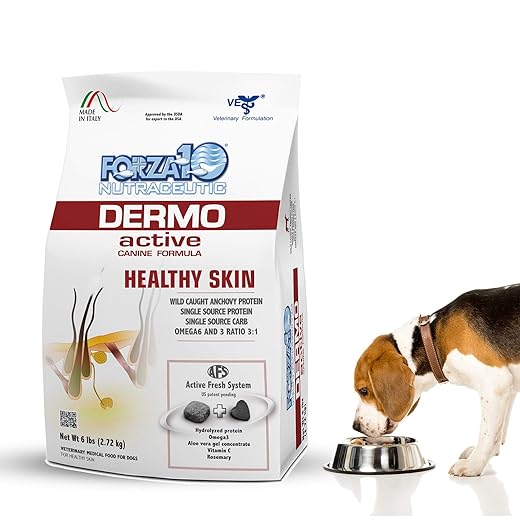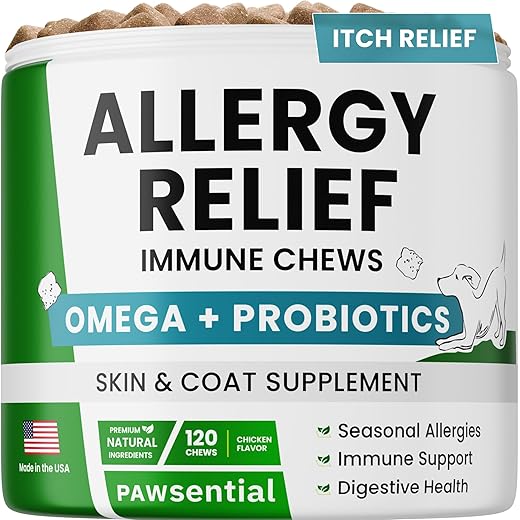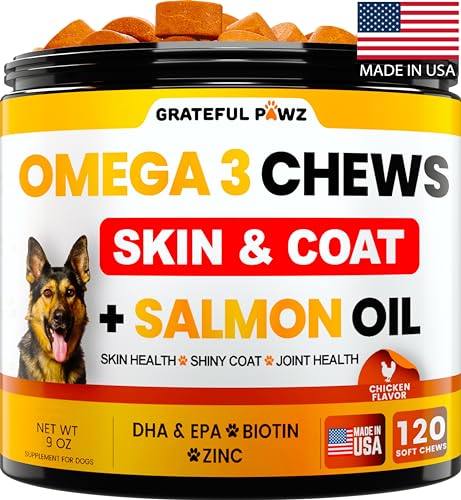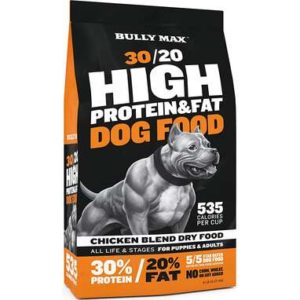Pitbulls, like other breeds, can sometimes develop skin allergies that can cause discomfort and irritation. Choosing the right dog food for Pitbulls with skin allergies is crucial in managing their condition and promoting overall skin health.
When selecting dog food for Pitbulls with skin allergies, look for options that are specifically formulated for sensitive skin or allergies. These foods typically contain limited and high-quality ingredients, avoiding common allergens such as wheat, corn, soy, and artificial additives. Opt for dog foods that include novel protein sources like lamb, fish, or venison, as these are less likely to trigger allergic reactions.
It’s also beneficial to choose dog food that is rich in omega-3 fatty acids, such as fish oil or flaxseed, as these can help improve skin health and reduce inflammation. Additionally, consider foods that contain antioxidants and vitamins, which can support a healthy immune system and promote skin healing.
Always consult with your veterinarian before making any changes to your Pitbull’s diet, as they can provide specific recommendations based on your dog’s individual needs and allergies. Regularly monitoring your Pitbull’s skin condition and noting any changes or improvements will help you determine the effectiveness of the chosen dog food.
Remember, managing skin allergies in Pitbulls involves a holistic approach that includes not only dietary changes but also proper grooming, regular bathing with hypoallergenic shampoos, and avoiding potential environmental allergens. Working closely with your veterinarian will ensure that your Pitbull receives the best care and treatment for their specific skin allergy needs.
Can dogs live with allergies?
Yes, dogs can live with allergies. Allergies in dogs are a common condition and can range from environmental allergies (such as pollen, dust mites, or mold) to food allergies or sensitivities. While allergies can be a lifelong condition, they can typically be managed with proper care and treatment.
The key to helping dogs live with allergies is to identify and avoid the allergens that trigger their symptoms. This may involve making changes to their environment, such as reducing exposure to certain outdoor allergens or using air purifiers in the home. In the case of food allergies, identifying and eliminating specific ingredients from the dog’s diet is necessary.
In addition to allergen avoidance, veterinarians may prescribe medications to help manage allergy symptoms. These can include antihistamines, corticosteroids, or immune-modulating drugs. In some cases, immunotherapy (allergy shots) may be recommended to desensitize the dog’s immune system to specific allergens over time.
Regular veterinary check-ups and open communication with your veterinarian are crucial for managing allergies in dogs. They can help determine the best course of action, monitor your dog’s progress, and make necessary adjustments to the treatment plan. With proper care, most dogs with allergies can live happy and comfortable lives.
What are signs of dog allergies?
Signs of dog allergies can vary depending on the type of allergy and the individual dog, but common signs of allergies in dogs may include:
- Itching and scratching: Dogs with allergies often exhibit intense itching, which can lead to scratching, biting, and licking of the affected areas. This can result in red, inflamed, or irritated skin.
- Skin problems: Allergies in dogs can manifest as various skin problems, such as rashes, hives, hot spots (moist, inflamed areas), or recurring ear infections.
- Digestive issues: Some dogs with food allergies or sensitivities may experience gastrointestinal symptoms, including vomiting, diarrhea, or excessive gas.
- Sneezing and respiratory symptoms: Like humans, dogs can have allergies that affect their respiratory system. Sneezing, coughing, wheezing, or nasal congestion can be signs of respiratory allergies in dogs.
- Eye and ear problems: Allergies can cause dogs to have red, watery, or itchy eyes. They may also develop ear infections or constant head shaking due to allergy-related ear inflammation.
- Hair loss or poor coat condition: Allergies can sometimes lead to hair loss, thinning coat, or changes in coat texture, such as dryness or excessive shedding.
If you suspect your dog has allergies, it’s important to consult with a veterinarian for proper diagnosis and treatment. They can help determine the underlying cause of the allergies and recommend appropriate management strategies, which may include dietary changes, medication, or allergen avoidance.
What foods are pitbulls most allergic to?
Pitbulls, like any other breed, can develop allergies to a variety of food ingredients. However, there are certain foods that are commonly associated with allergies in dogs, including Pitbulls. The most common food allergens for dogs, including Pitbulls, include:
- Chicken: Chicken is a common protein source in commercial dog foods, and some Pitbulls may develop allergies or sensitivities to it.
- Beef: Beef is another common protein source that can trigger allergic reactions in dogs, including Pitbulls.
- Dairy Products: Dairy products such as milk, cheese, and yogurt can cause allergic reactions in some dogs, including digestive issues and skin problems.
- Wheat: Wheat is a common grain ingredient in dog food and can be a potential allergen for some Pitbulls.
- Soy: Soy is another common ingredient found in commercial dog foods and can be a source of allergies for certain dogs.
- Corn: Corn is a common grain used in dog food, and some Pitbulls may be allergic or sensitive to it.
It’s important to note that individual dogs can have different sensitivities and allergies. If you suspect your Pitbull has food allergies, it’s best to consult with a veterinarian. They can help determine the specific allergens through diagnostic tests or elimination diets and recommend an appropriate diet plan for your Pitbull’s specific needs.
Is there a dog food that helps with skin allergies?
Yes, there are specific dog foods formulated to help with skin allergies in dogs, including Pitbulls. These foods are often labeled as “limited ingredient diets” or “hypoallergenic” and are designed to minimize potential allergens that can trigger skin reactions. Here are some features of dog foods that can be beneficial for dogs with skin allergies:
- Novel Protein Sources: These dog foods use alternative protein sources that are less commonly associated with allergies, such as duck, venison, or fish.
- Limited Ingredients: Limited ingredient diets typically contain a smaller number of ingredients, reducing the chances of triggering an allergic reaction.
- Grain-Free or Grain-Limited: Some dogs with skin allergies may benefit from grain-free or grain-limited diets. Removing common grains like wheat, corn, and soy can help alleviate allergic symptoms in some cases.
- Added Omega-3 Fatty Acids: Omega-3 fatty acids, typically sourced from fish oil, can help support healthy skin and reduce inflammation associated with skin allergies.
It’s important to note that each dog’s allergy triggers and dietary needs can vary. It’s recommended to consult with a veterinarian to determine the best food options for your Pitbull with skin allergies. They can provide guidance tailored to your dog’s specific condition and help you choose the most appropriate dog food for their needs.
What food is best for pitbulls with skin allergies?
When it comes to selecting the best food for Pitbulls with skin allergies, it’s important to focus on options that are formulated to address sensitivities and promote skin health. Here are some key factors to consider when choosing dog food for Pitbulls with skin allergies:
- Limited Ingredient Diet: Look for dog foods with a limited number of high-quality ingredients. This helps minimize the risk of triggering allergic reactions and makes it easier to identify and avoid specific allergens.
- Novel Protein Sources: Opt for dog foods that include novel protein sources like lamb, fish, duck, or venison. These proteins are less commonly used in commercial dog foods and are less likely to cause allergies compared to more common protein sources like chicken or beef.
- Grain-Free or Limited Grain Options: Some Pitbulls with skin allergies may benefit from a grain-free diet. However, it’s important to note that not all dogs with skin allergies have issues with grains. Consult with your veterinarian to determine if a grain-free or limited grain diet is necessary for your Pitbull.
- Omega-3 Fatty Acids: Look for dog foods that contain added omega-3 fatty acids, such as fish oil or flaxseed. Omega-3 fatty acids have anti-inflammatory properties and can help improve skin health and reduce allergic reactions.
- Allergen-Free Ingredients: Avoid common allergens like wheat, corn, soy, and artificial additives. These ingredients can potentially exacerbate skin allergies in Pitbulls.
- Hypoallergenic Formulas: Consider hypoallergenic dog food formulas specifically designed for dogs with food sensitivities or allergies. These formulas typically feature a carefully selected range of ingredients to minimize the risk of triggering allergic reactions.
Always consult with your veterinarian before making any changes to your Pitbull’s diet, as they can provide specific recommendations based on your dog’s individual needs and allergies. They may also suggest conducting a food trial or allergy testing to identify specific allergens and customize a diet plan accordingly.
What foods to avoid for dogs with allergies skin?
When it comes to dogs with skin allergies, it’s generally recommended to avoid certain ingredients that commonly trigger allergic reactions. Here are some foods to avoid for dogs with allergies:
- Common Allergens: Wheat, corn, soy, and dairy products are known allergens for many dogs. These ingredients should be avoided or limited in the dog’s diet.
- Protein Sources: Some dogs can develop allergies to specific protein sources such as beef, chicken, or lamb. If your Pitbull has a known allergy to a specific protein, it’s important to avoid dog foods that contain that protein.
- Artificial Additives: Artificial preservatives, colors, and flavors can potentially worsen allergic reactions. Opt for dog foods that are free from artificial additives or choose natural and minimally processed options.
- Fillers and By-products: Low-quality dog foods often contain fillers and by-products that may trigger allergies in some dogs. It’s best to choose dog foods that prioritize high-quality, whole-food ingredients.
- Food Additives and Grains: Some dogs may be sensitive to certain food additives like food colorings or preservatives. Additionally, grains like wheat, corn, and soy are common allergens, so it’s advisable to avoid dog foods containing these ingredients.
Remember, every dog is unique, and what works for one may not work for another. If your Pitbull has skin allergies, it’s recommended to consult with a veterinarian who can perform allergy testing or provide guidance on an elimination diet to identify specific allergens and create a suitable dietary plan for your dog.
How do you fix a pitbull allergy?
Fixing a pitbull’s allergy involves identifying the allergen causing the reaction and taking appropriate steps to manage or eliminate exposure to it. Here are some steps to address pitbull allergies:
- Consult a Veterinarian: If your pitbull is experiencing allergies, it’s essential to consult a veterinarian. They can help identify the specific allergen through allergy testing and provide guidance on the best course of action.
- Elimination Diet: In some cases, an elimination diet may be recommended to identify the specific food allergens causing the reaction. This involves feeding your dog a limited ingredient diet with novel protein and carbohydrate sources to see if the symptoms improve. By gradually reintroducing suspected allergens, you can identify the specific triggers.
- Dietary Changes: Once the allergens are identified, your veterinarian may recommend switching to a hypoallergenic or limited ingredient diet that avoids the specific allergens. This may involve feeding a commercial hypoallergenic dog food or preparing homemade meals with carefully selected ingredients.
- Environmental Management: Allergies can also be triggered by environmental factors such as pollen, dust mites, or certain chemicals. Reducing exposure to these allergens by keeping the environment clean, using air purifiers, and minimizing outdoor exposure during high pollen seasons can help alleviate symptoms.
- Medications and Treatments: In some cases, medications such as antihistamines or steroids may be prescribed to manage allergic symptoms. Topical treatments like medicated shampoos or creams can also provide relief for skin-related allergies.
It’s important to note that managing pitbull allergies requires a comprehensive approach and individualized care. Working closely with a veterinarian will help develop the most suitable treatment plan for your pitbull to alleviate symptoms and improve their quality of life.
How can I reduce my dogs allergies naturally?
While it’s essential to consult with a veterinarian for proper diagnosis and treatment of your dog’s allergies, there are some natural approaches that may help reduce allergic symptoms. Here are a few suggestions:
- Keep the Environment Clean: Regularly clean your home to minimize allergens like dust, pollen, and mold. Vacuum frequently, wash bedding regularly, and use hypoallergenic cleaners. Consider using air purifiers to filter out allergens from the air.
- Limited Ingredient Diet: Switching to a limited ingredient diet with high-quality, hypoallergenic ingredients can help identify and avoid food allergens. Consult with your veterinarian to determine the most suitable diet for your dog’s specific needs.
- Omega-3 Fatty Acids: Adding omega-3 fatty acids to your dog’s diet, such as fish oil, can help reduce inflammation and promote healthy skin. Consult with your veterinarian for appropriate dosage and form of supplementation.
- Bathing: Regularly bathing your dog with a hypoallergenic shampoo can help remove allergens from their skin and coat. However, be careful not to over-bathe, as it can dry out their skin. Consult with your veterinarian for guidance on bathing frequency and suitable products.
- Natural Remedies: Some natural remedies, such as herbal supplements or homeopathic remedies, may provide relief for certain dogs. However, it’s crucial to consult with your veterinarian before using any natural remedies to ensure they are safe and appropriate for your dog.
- Environmental Management: Minimize exposure to potential environmental allergens. Keep your dog away from known triggers like grass, pollen, or certain plants. Limit outdoor activities during high pollen seasons or consider using protective clothing to reduce contact with allergens.
Remember, natural approaches may provide some relief, but they may not completely eliminate allergies. It’s important to work closely with your veterinarian to develop a comprehensive treatment plan that addresses your dog’s specific allergies and provides the best course of action.
How can I improve my dogs skin allergies?
Improving your dog’s skin allergies requires a multifaceted approach and may involve a combination of medical treatment and environmental management. Here are some steps you can take to help improve your dog’s skin allergies:
- Consult with a Veterinarian: First and foremost, consult with a veterinarian who specializes in dermatology or allergies. They can perform diagnostic tests to identify the specific allergens causing your dog’s symptoms and develop a tailored treatment plan.
- Allergen Avoidance: Identify and minimize exposure to the allergens that trigger your dog’s skin allergies. This may involve avoiding certain foods, using hypoallergenic bedding and cleaning products, and reducing exposure to environmental allergens like pollen, dust mites, or mold.
- High-Quality Diet: Feed your dog a high-quality, nutritionally balanced diet that supports skin health. In some cases, your veterinarian may recommend a hypoallergenic or limited ingredient diet to identify and avoid food allergens.
- Medications: Your veterinarian may prescribe medications to help manage your dog’s allergic symptoms. These may include antihistamines, corticosteroids, or immunosuppressive drugs to reduce inflammation and alleviate itching.
- Topical Treatments: Depending on the severity of the skin allergies, your veterinarian may recommend topical treatments such as medicated shampoos, sprays, or creams to soothe the skin, control infections, and manage symptoms.
- Regular Bathing: Regular bathing with a veterinarian-recommended shampoo can help remove allergens from your dog’s skin and coat. However, be cautious not to over-bathe, as it can strip the skin of its natural oils and worsen dryness.
- Supplements: Your veterinarian may recommend specific supplements to support your dog’s skin health, such as omega-3 fatty acids, which have anti-inflammatory properties.
- Environmental Control: Keep your home clean and minimize exposure to potential allergens. Vacuum frequently, wash bedding regularly, and consider using air purifiers to filter out allergens from the air.
- Regular Vet Check-ups: Regular check-ups with your veterinarian are essential to monitor your dog’s progress, adjust the treatment plan if necessary, and address any concerns or new symptoms.
Remember, managing skin allergies in dogs can be a complex process, and what works for one dog may not work for another. It’s crucial to work closely with your veterinarian to develop a tailored plan that addresses your dog’s specific needs and provides the best possible care.
Factors to consider when buying dog food for pitbulls with skin allergies?
When buying a golf glove, there are several factors that you should consider, including:
- Material: Golf gloves are made from different materials such as synthetic leather, leather, and hybrid materials. Leather gloves offer better feel and durability, while synthetic gloves are more affordable and lightweight.
- Fit: A good golf glove should fit snugly but not too tight or too loose. It should allow you to grip the club comfortably and enable you to maintain a consistent grip throughout the round.
- Durability: Look for gloves that are made with durable materials and reinforced seams to ensure that they will last longer.
- Breathability: Golf gloves can get hot and sweaty, so it’s essential to choose gloves that are breathable and can wick away moisture to keep your hands cool and dry.
- Grip: Some golf gloves have textured palms that provide a better grip, which can be useful in wet conditions.
- Price: Golf gloves come in different price ranges, so it’s essential to find one that fits your budget while still meeting your needs.
- Brand: Different brands have different designs, materials, and sizes, so it’s worth considering the reputation and quality of the brand before making a purchase.
How long does it take for dog food allergies to clear up?
The time it takes for dog food allergies to clear up can vary depending on several factors, including the severity of the allergies, the specific allergens involved, and how well the allergens are identified and managed. In some cases, it may take several weeks to months to see significant improvement.
If your dog has a diagnosed food allergy, your veterinarian may recommend a trial period of feeding a hypoallergenic or limited ingredient diet. This trial period typically lasts for about 8 to 12 weeks. During this time, your dog will be fed only the hypoallergenic diet, avoiding all other potential allergens. If there is a positive response and improvement in your dog’s symptoms, it indicates that the previous diet was likely causing the allergies.
After the trial period, your veterinarian may recommend reintroducing specific ingredients one at a time to identify the specific allergens. This process is called an elimination diet or a food trial. It can take several months of carefully controlled reintroduction to identify all the allergens and create a long-term diet plan that avoids those triggers.
It’s important to note that food allergies in dogs are often a lifelong condition, and complete resolution of allergies may not always be possible. However, with proper identification and management of allergens, you can significantly improve your dog’s quality of life and minimize symptoms.
It’s crucial to work closely with your veterinarian throughout the process to ensure proper diagnosis, treatment, and monitoring of your dog’s allergies. They can provide guidance, monitor your dog’s progress, and make necessary adjustments to the treatment plan to help manage the allergies effectively.
Conclusion
Choosing the right dog food for Pitbulls with skin allergies is essential for their health and well-being. Look for limited ingredient diets, novel protein sources, and consider grain-free or limited grain options. Opt for dog foods with high-quality ingredients, omega-3 fatty acids, and allergen testing if available.
Consulting with your veterinarian is crucial to identify specific allergens and ensure you’re making the best choice for your Pitbull’s needs. With the right dog food, you can help alleviate skin allergies and promote a healthier coat and skin for your beloved Pitbull.
You May Also Like These Deals!
What is the best food for a Pitbull?
Pitbulls, like all dogs, require a balanced and nutritious diet...
Read MoreWhat kind of toy is good for a Pitbull?
A Pitbull toy refers to a toy specifically designed for...
Read MoreWhat is the best shampoo for my pitbull?
Pitbull shampoo is a specially formulated shampoo designed to meet...
Read MoreWhat is the best dog food?
Dog food refers to the specially formulated food that is...
Read MoreProducts recommended in the post contain affiliate links. We may receive a commission when you buy something through our posts.
Why Trust Us
You will find what you are looking for at Black Friday Weeks. From classic to luxury brands, you'll find both. We will help you to select appliances that fit your needs, budget and lifestyle. Whether you want to stop by to learn more — or plan to make a major purchase — we’ll treat you like family and assist you every step of the way. Shop with us today to receive friendly and experienced help along the way.

